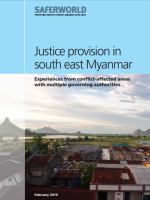Justice provision in conflict-affected areas with multiple authorities
Conflict between the government of Myanmar and ethnic armed organisations has lasted for over 60 years, often involving competition for territorial control and disputed authority over local populations.
In south east Myanmar, the Karen National Union (KNU) and its main armed wing, the Karen National Liberation Army (KNLA), have been fighting for greater autonomy and a federal system of government since 1949. Contestation has played out not only through violent conflict, but also through governance and service delivery. An environment has evolved in which the de facto jurisdictions of multiple ethnic armed organisations, bodies of the state, and government-backed militia are not explicitly defined. In this context, there are multiple actors who enforce law and order and provide justice.
This report explores how justice is provided within the context of multiple authorities and plural justice systems with a geographical focus on Karen populated areas of southeast Myanmar. It includes four in-depth anthropological case studies on how disputes are resolved and by whom, and how people perceive and experience justice. The cases cover an urban government-controlled ward, a KNU-controlled village, a mixed-controlled village and a government-controlled village with multiple armed actors. Particularly it compares the effectiveness and legitimacy of the prevailing justice actors across the four sites, and then makes policy recommendations for international agencies and the Myanmar government.
The report confirms other recent research on access to justice in Myanmar, which shows that the majority of people prefer to settle crimes and disputes within their own ward or village, and that they try as much as possible to avoid the official state courts and police. Simultaneously, it goes more into depth with the reasons behind such local justice preferences, which is only partly caused by the dysfunctionality of the official justice system. Other reasons inter alia include:
- Fear of formality and official authorities caused by decades of military rule
- Cultural and religiously informed perceptions of problems and justice
- Socio-economic conditions privileging a preference for compensational justice
- Language, identity and familiarity with local leaders
The anthropological studies draw on research conducted by the DIIS-coordinated research project Everjust ‘Everyday Justice and Security in the Myanmar Transition’, which is done in partnership with Yangon University, the Enlightened Myanmar Research Foundation, and Aarhus University.
This project has covered extensive ethnographic fieldwork between 2016 and 2018. It is funded by the Danish Ministry of Foreign Affairs through the development research grant. Different insights from a KAP survey conducted by Saferworld in 2017 are also included.
By comparing the different case study areas, the report also shows that local justice provision is strongly influenced by the specific political-legal context. It is least effective in areas with many competing authorities and multiple armed actors, which is particularly the case in mixed-controlled areas where there is no clear external authority to back local level decisions. Another challenge to effective local dispute resolution is where there are weak or no institutional links to a higher-level justice system, which is the case in Myanmar government-controlled areas.
Conversely, the report shows that the KNU’s justice system is seen as more legitimate than the government system and that the quality of justice is highest in the KNU-controlled village. This is not only due to political loyalties, but also to the fact that theKaren National Union has established strong links to and collaboration with village level dispute resolution. There is also a higher level of female participation in KNU areas. This finding informs the recommendation to discuss ways of recognizing the KNU’s justice system, and of linking the peace process and national justice sector reform more generally.
DIIS Experts



